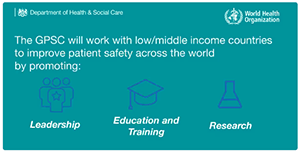Global Patient Safety Collaborative (GPSC)
The Global Patient Safety Collaborative (GPSC) is a strategic initiative established by the joint efforts of WHO and the Government of the United Kingdom of Great Britain and Northern Ireland, which recognizes the importance of patient safety as one of the critical components of health care delivery systems, essential to progressing towards universal health coverage and achieving the Sustainable Development Goals.
The main objective of the Collaborative is to secure and scale up global action on patient safety, as well as to reduce the risk of avoidable harm and improve the safety of health systems at the country level. Overall work of the Collaborative is organized around three strategic areas:

- leadership to prioritize patient safety, promote a patient safety culture and engage patients and families;
- education and training to build a competent, skilled and compassionate health workforce through interprofessional education and training in patient safety; and
- research and research capacity to support evidence-based policy processes in patient safety.
The GPSC model incorporates two types of cooperation with countries: indirect/generic and direct/bespoke.
Through indirect/generic cooperation, all interested countries are able to access a wide range of existing and newly developing resources on patient safety, participate in and contribute to collaborative networks and platforms, share knowledge, and learn from the wide variety of experiences and best practices in patient safety at the global, regional and country levels.
Through direct/bespoke cooperation, certain countries have the opportunity to implement additional country-level activities within the scope of the three strategic areas, based on their country-specific priorities and needs. Activities include building capacity in patient safety policy development, practice areas and research; adapting global tools and resources to country-specific contexts; implementing the global frameworks at country level; performing research and strengthening research capacity; developing evidence-based policies and strategies as well as strengthening institutional mechanisms for patient safety improvement at country level. The choice of countries for direct/bespoke collaboration have so far been based on expressions of interest to collaborate, gathered through a structured process, involving the three levels of WHO. The four countries engaged in direct/bespoke cooperation in 2019-2021 are India, Kenya, Mongolia and Pakistan.
During the course of implementation, WHO is cooperating with its academic partner — Imperial College London – which provides all-inclusive support in the implementation of the different activities of the Collaborative across its three strategic areas.
Global Patient Safety Collaborative Network
The Global Patient Safety Collaborative (GPSC) Network was established as a sub-community within the broader Global Patient Safety (GPS) Network. The GPSC Network brings together key stakeholders at global, regional and country level, involved in implementation of the Collaborative and serves as a platform for all stakeholders to share experiences, including best practices and lessons learned; raise concerns and initiate discussions; share resources and support continuous learning on various patient safety topics.
In 2019-2021, the GPSC Network is connecting stakeholders from the countries engaged in direct cooperation within the framework of the Collaborative, including the nominated focal points from the Ministries of Health from India, Kenya, Mongolia and Pakistan, and WHO Country Offices for these countries. The WHO regional offices for South-East Asia, Africa, the Western-Pacific and Eastern-Mediterranean regions, as well as the core team of the Patient Safety Translational Research Centre, Imperial College London, are also connected through the Network. At a later stage, with the extension of the Collaborative, the GPSC Network intends to engage more and new stakeholders, from further countries across all WHO regions.
Related documents
Academic partner
Related Health Topic
Related links
